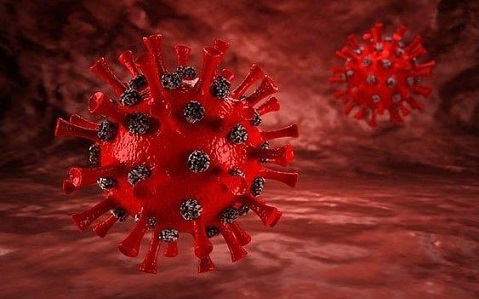Nikhil Prasad Fact checked by:Thailand Medical News Team Jul 17, 2024 10 months, 6 days, 2 hours, 21 minutes ago
COVID-19 News: Recent research led by scientist from various esteemed institutions, including Kumamoto University in Japan, CQ University in Australia, and the Texas Biomedical Research Institute-USA, has delved into the intricate relationship between a group of proteins known as APOBEC3 and the replication of SARS-CoV-2, the virus responsible for COVID-19. This
COVID-19 News report explores their findings and what they mean for the future of COVID-19 research and treatment.
 APOBEC3 proteins play key role in SARS-CoV-2 replication
APOBEC3 Proteins: The Basics
APOBEC3 proteins play key role in SARS-CoV-2 replication
APOBEC3 Proteins: The Basics
The APOBEC3 family of proteins is a set of seven DNA cytosine deaminases that play a crucial role in our body’s innate defense mechanisms. These proteins are known to combat viruses by inducing mutations that can disable viral genomes. Notably, they target cytosines in the viral DNA, converting them to uracil, which results in G-to-A mutations in the viral genome. The most studied of these interactions has been with the human immunodeficiency virus (HIV), but recent studies have suggested that similar mechanisms might be at play with SARS-CoV-2.
The Study at a Glance
The study team focused on understanding how APOBEC3 proteins influence the replication of SARS-CoV-2. They specifically looked at whether these proteins caused mutations in the viral genome and whether they played any role in viral replication. Their study used a myeloid leukemia cell line called THP-1, which was modified to lack the genes for APOBEC3A to APOBEC3G proteins. They compared the replication of three variants of SARS-CoV-2 (Wuhan, BA.1, and BA.5) in these modified cells to that in normal THP-1 cells.
Key Findings: No Evidence of APOBEC3-Induced Mutations
Interestingly, the researchers found that the absence of APOBEC3 proteins did not significantly affect the short-term replication of the virus.
Over a longer period (20 days), however, the lack of these proteins resulted in a noticeable decrease in viral replication and infectivity. This suggests that while APOBEC3 proteins may not cause mutations in the viral genome, they do play a supportive role in the virus's ability to replicate and spread.
Long-Term Replication and Infectivity
The researchers observed that in the normal THP-1 cells, the virus continued to replicate over multiple passages (about 20 days), while in the APOBEC3-lacking cells, the replication diminished significantly. This long-term effect indicates that APOBEC3 proteins might help the virus maintain its replication machinery over extended periods.
Infectivity of the Virus
Further tests showed that the infectiousness of the virus, measured by its ability to form plaques (a sign of successful infection), was also higher in cells with APOBEC3 proteins. This was a surprising finding, as it suggests that these proteins, while known for their antiviral roles, might paradoxically support the infectivity of SARS-CoV-2.
&
nbsp;
Mutagenesis Analysis
To dig deeper, the team performed whole-genome sequencing of the viral RNA to identify mutations. They found very few mutations, and importantly, none of the expected C-to-U mutations characteristic of APOBEC3 activity. This was further supported by a large-scale analysis of over 40,000 SARS-CoV-2 genomes, which also did not show significant APOBEC3-related mutational signatures.
Deaminase-Independent Mechanisms
These findings suggest that the role of APOBEC3 proteins in SARS-CoV-2 replication is independent of their well-known enzymatic activity that induces mutations. The study points towards other mechanisms, possibly involving protein-protein interactions, that support viral replication and infectivity.
Broader Implications for Virus Research
APOBEC3 proteins have been extensively studied in the context of HIV and other viruses, and their role in RNA viruses like SARS-CoV-2 opens new avenues for research. Understanding these mechanisms could lead to novel therapeutic strategies that either enhance the antiviral functions of APOBEC3 proteins or inhibit their supportive role in viral replication.
Conclusion
The study findings provide valuable insights into the complex role of APOBEC3 proteins in SARS-CoV-2 replication. While these proteins do not seem to induce mutations in the viral genome, they do play a crucial role in maintaining long-term viral replication and infectivity. This deaminase-independent function highlights the multifaceted nature of APOBEC3 proteins and their potential as targets for future antiviral therapies.
The study findings were published in the peer-reviewed journal: Viruses.
https://www.mdpi.com/1999-4915/16/7/1141
For the latest
COVID-19 News, keep on logging to Thailand Medical News.
Read Also:
https://www.thailandmedical.news/news/covid-19-genetics-regulatory-variants-of-apobec3-genes-linked-to-covid-19-severity-in-populations-with-african-ancestry
https://www.thailandmedical.news/news/research-shows-activation-induced-cytidine-deaminase-aid-and-apobec-proteins-play-a-important-role-in-the-human-immune-system-against-the-sars-cov-2-v
https://www.thailandmedical.news/news/sars-cov-2-mutations-study-shows-human-host-proteins-apobec-is-causing-sars-cov-2-to-mutate-but-novel-coronavirus-evolves-to-survive
